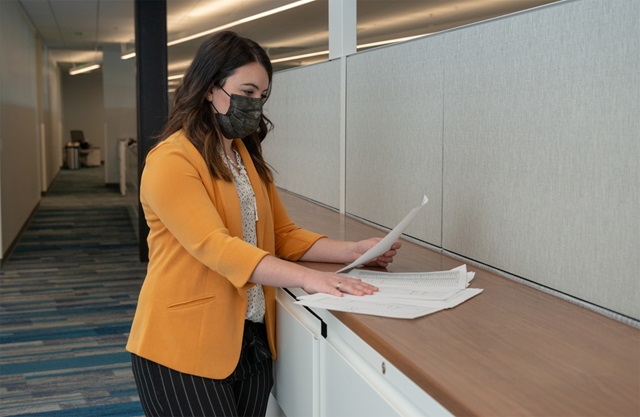By Andie Holmes
When I began my career with Northrop Grumman as an intern in 2013, I joined a team that had more than 150 collective years of intercontinental ballistic missile (ICBM) knowledge — a sharp contrast from me, a college intern, but I was ready and eager to learn.

I started out analyzing data on the Minuteman III ICBM Prime Integration Contract at Hill Air Force Base in northern Utah, supporting the team as we performed analysis on a critical component within the weapon system. From the start, it was obvious that I was joining a strong community of people who shared a mutual vision. At the time, a majority of our leaders had retired from the Air Force and brought a “mission first” mentality to our team, which really aligned us with our customer’s goals.
That mission-driven mindset — combined with the wealth of knowledge and support I was surrounded by — empowered me, setting the pace for a quick introduction to ICBMs and systems engineering.
From there, I hit the ground running. After my internship ended, I was hired to work on Minuteman III full-time, and soon after, I was asked to lead my own team’s internship program, in addition to my day job working on ICBM systems. It was a full-circle moment.
I recruited interns, introduced them to hiring managers and, eventually, supported them when they received their first job offers to join our team. Not only was I sustaining the aging ICBM system, but I was cultivating a new class of engineers who could, like me, begin their adult lives with Northrop Grumman and continue supporting the system that I fell in love with as an intern.

By showing interns the success and excitement of a career with Northrop Grumman supporting the nuclear triad’s mission, I felt like I was paying it forward, providing the same mentorship and community that I had experienced at that stage. Helping interns launch their own careers with Northrop Grumman was one of the most rewarding parts of my early career.
In 2014, I joined the Ground Subsystems Support Contract (GSSC) team as part of the first group of engineers selected to support the next phase of sustaining the Minuteman III system. Seven years later, I’m currently one of the team’s seasoned engineers — thanks to my ICBM experience — and, more importantly, I’m now a mentor to a new cohort of engineers.
My advice to them is that your experience is what you make of it. Build your network, explore the opportunities you are presented with and trust in the team experience. It’s invaluable.
I say this because I experienced it myself. Saying yes to an internship at Northrop Grumman opened up doors I had no idea existed. As an intern, you don’t always realize the potential for growth at a company, but, at Northrop Grumman, there truly is no limit to what you can do or where you may end up.

Currently, I have my eyes set on the next chapter of GSSC: Northrop Grumman’s GSSC 2.0 proposal, which would effectively sustain the Minuteman III Ground Subsystems to ensure a viable nuclear deterrent through 2038. Being able to see the end-of-life of a weapon system — the same system I started with and learned on — is a once-in-a-career opportunity. And, now our company is working on the replacement for Minuteman III, the GBSD program, continuing a legacy in strategic deterrence
In just eight short years, I’ve gone from intern to new hire to senior engineer and program manager; from being the most inexperienced on my team to becoming a subject matter expert. But, for all those titles, “mentor” might just be my favorite.
Return to the Life at Northrop Grumman home page.